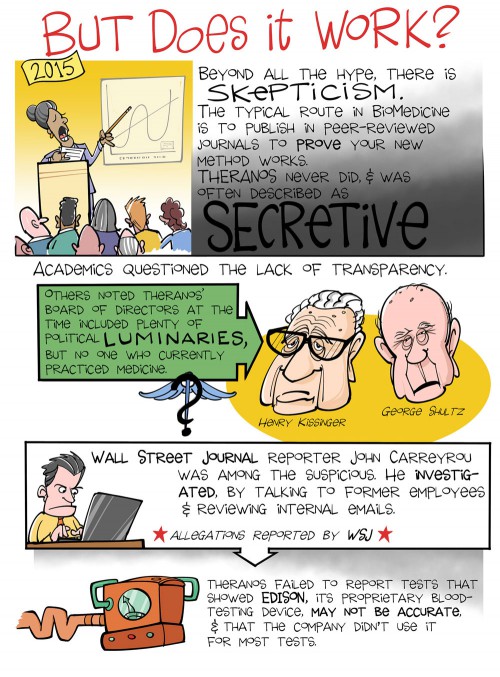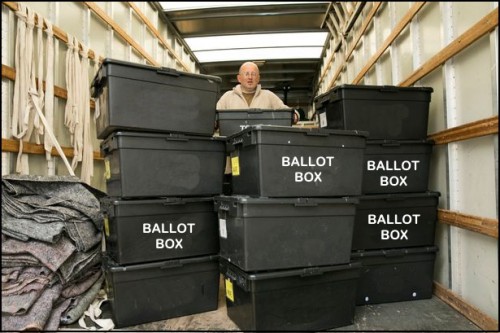It’s not often that ideas in evolutionary theory become directly applicable to politics, but now we have a case of plagiarized errors in the Trump campaign. “Plagiarized errors” is the idea that the propagation of mistakes is often more revealing of the history of a lineage than the functional parts of an organism. The example often give is of how we can catch students cheating on a test: if two students turn in an exam with identical correct answers, it could just mean they both studied very hard and mastered the material well; if they have identical wrong answers, right down to the spelling mistakes, that tells you that someone has been slavishly copying someone else. For more examples of how the concept is actually used, check out Plagiarized Errors and Molecular Genetics by Edward Max.
The nice thing about the plagiarized error concept is that it allows one to trace the history of the error. In the recent debate, Trump made an unusual error of attribution — he quoted Kurt Eichenwald (incorrectly, as it turns out, ignoring his conclusion) and claimed that it was a quote from Sydney Blumenthal. It was an odd combination of specific errors, and that makes one wonder where Trump could have gotten the same set of mistakes. It turns out that there is only one other media source that makes the same combination of errors, misattributing Eichenwald’s words to Blumenthal, and distorting the meaning of the piece in the same strange way, and that tells us exactly what source Trump plagiarized.
It came from “Sputnik, the Russian online news and radio service established by the government controlled news agency, Rossiya Segodnya“. Russian propaganda sources are feeding misinformation to the Trump campaign.
As Eichenwald explains the distortions and errors in the Russian piece:
The Russians were quoting two sentences from a 10,000 word piece I wrote for Newsweek, which Blumenthal had emailed to Podesta. There was no mistaking that Blumenthal was citing Newsweek—the magazine’s name and citations for photographs appeared throughout the attached article. The Russians had carefully selected the “of course” paragraph, which mentions there were legitimate points of criticism regarding Clinton and Benghazi, all of which had been acknowledged in nine reports about the terror attack and by the former Secretary of State herself. But that was hardly the point of the story, “Benghazi Biopsy: A Comprehensive Guide to One of America’s Worst Political Outrages.” The piece is about the obscene politicization of the assault that killed four Americans, and the article slammed the Republican Benghazi committee which was engaged in a political show trial disguised as a Congressional investigation—the tenth inquiry into the tragedy.
And then, to his surprise, Trump makes exactly the same set of mistakes.
At a rally in Wilkes Barre, Pennsylvania, Trump spoke while holding a document in his hand. He told the assembled crowd that it was an email from Blumenthal, whom he called “sleazy Sidney.”
“This just came out a little while ago,’’ Trump said. “I have to tell you this.” And then he read the words from my article.
“He’s now admitting they could have done something about Benghazi,’’ Trump said, dropping the document to the floor. “This just came out a little while ago.”
Further, Trump did this on the same day that the Sputnik article emerged — it wasn’t as if this lie had time to percolate out into right wing media. The Trump campaign is being fed stories by the Russian media, or at the most benign, is reading Russian propaganda looking for dirt to dish on Clinton.
This is not funny. It is terrifying. The Russians engage in a sloppy disinformation effort and, before the day is out, the Republican nominee for president is standing on a stage reciting the manufactured story as truth. How did this happen? Who in the Trump campaign was feeding him falsehoods straight from the Kremlin? (The Trump campaign did not respond to a request for comment).
This is just weird. The Republicans, of Red Scare fame, with anti-Communist hatred imbedded deep in the brains, are now fielding a presidential candidate who admires Vladimir Putin and who glibly recites Russian propaganda as fact. And we don’t just have a Manchurian candidate, we have a Manchurian electorate that sees no problem with this.
The sad thing is that we have great difficulty getting the concept of plagiarized errors in evolution through to creationists, so I suspect the fanatical followers of Donald Trump won’t be able to comprehend the application of the concept to political propaganda, either.



